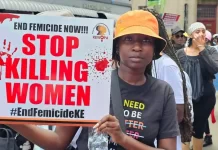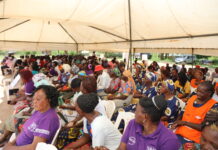By Joyce Njeri Kimani
Kiambu County, Kenya: “I felt so naked. I felt very naked,” Sarah Wanjiku Thiga, who vied for the Member of County Assembly (MCA) seat in Juja constituency in Theta, says online bullying was the first time she was stripped bare and reduced to a sex object.
“Sinister comments like I was beautiful and belonged to the runway, or what was good was the only thing in between my legs, became a norm. The hardest part of this, however, was that my mother, siblings, uncles, and all relatives were in this village WhatsApp groups where this communication was being made. It was, to say the least, traumatizing. Just thinking that these people just were able to see my body and not as a candidate and no matter how much we sold my political profile was so discouraging,” said Ms. Thiga.
Yet, she would not back out, despite it all. She believed she had the transformative leadership that the area needed and did not want to be reduced to an online platform complainer, and also since she had led in various leadership circles including Maendeleo ya Wanawake. She put on a spirited campaign, becoming a people’s favorite and a competitor’s serious threat. They, like many other people vying, opted for bloggers to troll her on a daily basis.
“Opening my phone in the morning was traumatizing, and so was reading any messages that were referenced to me. It eventually got to me. I became insomniac and obsessed with reading what people are saying about me. Every day I wanted my narrative to change. So bad that I had a mental breakdown and I had to be rushed to hospital at three a.m. My ulcers had raptured. I did not even know I had ulcers,” Ms.Thiga continued to narrate.
Social media was her biggest trigger, and watching how people are talking about her. So, she left all the WhatsApp groups just for peace of mind, a decision that made her competitors paint her as a weak candidate.
“I met with my team and they all came to the conclusion that I had to leave social media. They worked very well to defend me on social media and sell my manifesto to people while I lay low behind the scenes. Of course, that meant losing some votes as some people felt I could not handle the pressure/heat. Bloggers from other teams really took advantage of that and used the opportunity to discredit me though,” she explained during an interview.
“As a female politician, bloggers used to make me defend my manifesto all the time. It was questioned, criticized, analyzed word for word, and ironically, no male politician was asked for his.” She cited.
Ms. Thiga confides that being a young woman in politics, the ballgame is different.
“I had a powerful page on Facebook with around 17000 followers. I used it to influence the campaign. They could bully me on their pages but when it came to my pages, I mediate, I know how to write my narrative, and actually a lot of people thought I was running for the women’s seat position”.
Adding “I had escalated my campaign to a different level but I ran with a different vision and it was bigger. It was the scaling of national politics. Then the hacking began. I lost my page. They had to find a way to silence me, just a few days before the elections. This was despite me having protective measures like two-step verification,” she narrated.
Her attempts to get Meta the parent company of Facebook to get her page back were futile. She noted that despite the organization brushed her off with a comment that “People from your region do not get their pages back. Unless you get a lawyer to send pages back to USA to defend you,” she added. This was very hard because politics is about visibility.
“It was really hard to see what people thought about me. I thought when people saw me the first thing, they saw was a possible leader but the bloggers that were hired were to twist and instead of people seeing me as a leader they were to view me as a sex object,” she explains.
She would not shun her political ambitions, despite the name-calling, party intrigues, smear campaigns, and stereotypes that were thrown against her.
Yet, her story is not a new phenomenon in the Kenyan political circles. Women leaders, from the time they announce their political bids, have been bullied, maligned, slut shamed, and have had malicious stories planted about them on online platforms.
Five years ago, Wajir Woman Representative Fatuma Gedi, was a victim of cyberbullying after a viral sex tape in which she was accused of being the person behind the compromised photos. In an interview with Citizen Digital, Gedi claimed that this was an attempt by unnamed male politicians to paint her in a bad light.
A video editor from Tuko News, Douglas Baya was arrested for allegedly being behind the explicit fake sex tape. He was later released and all charges against him were dropped. Four Members of Parliament were also summoned by the Directorate of Criminal Investigations to record statements over the video.
While launching the campaign “Stop Cyberbullies Now” Council of Governors Chair and Kirinyaga Governor Ann Waiguru pointed out that women leaders have been particularly vulnerable to cyberbullying, including harassment, intimidation, and threats of violence. Waiguru cited that the internet has provided a platform for individuals to anonymously attack, insult, and harass others.
“I have personally been the target of numerous hurtful and offensive comments on social media, which have ranged from personal attacks on my appearance to attacks on my work,” she said.
Wanjiru Nguhi, the Progam Manager at Fumbua, a project that seeks to curb disinformation during the election, pointed out that there was a lot of gender disinformation especially targeted to Kenya Kwanza women leaders last year during the campaign. Ms. Nguhi pinpointed Karen Nyamu, Millicent Omanga, and Esther Passaris as some of the most targeted during this cyber war.
“There was always a hashtag trending and normally it was a negative one, and it was directed to putting women leaders in a very bad light. It was geared towards discrediting their leadership, and it was a narrative that was really prevalent during the elections,” she added.
However, she further says that the trends changed when Martha Karua was picked to be opposition leader Raila Odinga’s running mate, the attack was more about women holding political offices.
“It had nothing to do with her gender but the discussion was more about the place of a woman in the society. And comments that were coming out of the chats were more about how the gender is not strong enough to lead and be in such a “powerful” place,” she added.
To curb the bullying, Ms. Nguhi calls for platform accountability on social media pages, suggesting that they need to understand misogynistic attacks go up because of algorithms.
“It is an editorial choice. These platforms have the power to decide what goes viral and reduce its virality,” she added. Ms Nguhi, also pointed out that while some women opted for counter-bullying, violence for violence is a short-term solution.
“We need to clap back sometimes when your mental health is at 100 capacity for violence online otherwise it might backfire on you. Another unfortunate phenomenon is that when you are engaging with women online you are forced to engage with a masculine identity. Once in a while let it be known that you are a mad woman.”
However, she points out the need to come up with digital literacy masterclasses for women in politics.
“How to protect yourself online should be something that any woman seeking a political post should be trained on. Basics such as who do you reply to and not who, how to block and report people and even the legal mechanism that one can use to fight cyberbullying should be out there,” she affirmed.
She also proposed taking legal measures against bullies, pointing out the case of Esther Passaris who went to court and sued one of them.
“If you google about her, you will not see any bullying towards her. She taught them the most important lesson, that we can go and square it in courts,” she pointed out.
In 2019, Ms. Passaris threatened to sue popular blogger Robert Alai for a defamatory post targeted toward her. The post, which ran on his verified page, was later deleted with no explanation.

At one point, Ms. Passaris called out to the director of Criminal Investigation (DCI) to block former Nairobi Governor Mike Sonko from all social media platforms. This was after Sonko leaked videos implicating various individuals including Justice Said Chitembwe in alleged corrupt dealings, with one woman being exposed in a compromising situation. According to Passaris, Sonko infringed on the rights of the woman and his exposure of her constitutes online violence against her.
Stephanie Racheal Akinyi, popularly as Spontaneous the Poet, pointed out that people in political rivals assume that cyberbullying is a petty issue but then it affects the person at an individual level. Often individuals have been forced to leave their social media pages, which is a brand they have worked hard to build due to trauma that was left by online bullies. Bullying, she says, is the only way they regain their power and they feel like if they can make the women leader lose power, they would use it to their advantage.
“The people who have the power to curb this menace are the owners of the social media platforms. At the end of the day when you put stuff out you do not know who you are talking to, and the owners of the pages have access to them. Regulations and restrictions are not enough to control bullies. Permanently shutting down their pages is really important,” she stated.
Online users, she argues, should be cognizant that the leaders read at least fifty negative posts and the impact that this has on their mental health.
“Online bullying perpetrators thrive on victim blaming and shaming including politicians. If more people who have been harassed online would find the strength to speak it, it would lead to more conversations around this, making it easier to handle this issue and jot a way forward,” she adduced.
Samuel Waweru, popularly known as Anthem Republic, a human rights defender and community justice champion, points out that online bullying is a notion that should not be entertained.
“Leadership has nothing to do with gender. It is wrong to credit/ discredit women on online platforms based on their sex. I believe that if someone can deliver what they are proposing during elections, they deserve to get the position. Using the gender card on online platforms has not different from using the tribe card to not vote for someone, and it is utterly unacceptable,” he added.
Ruth Nyawira, a women’s rights activist, cites that bullies often are people who have issues with themselves, according to her observation.
“Most bullies are suffering from low self-esteem and self-hate, and are not satisfied with where they are currently in life. They hence opt to project their issues through trolling as a way of escaping from reality. It also is a fact that some people out there are just bad people, with evil hearts,” she said.
Ms. Nyawira points out that the trend increases during the electioneering period. She adds that with the increased awareness of trolling, there has also been an increase in vice.
“The more the women get the voices out there, the more opportunistic people, some who are paid to tarnish people’s reputation, engage in this. It, unfortunately, creates opportunities for bullies to analyze the loopholes and hurt others.”
To curb this, she advocates for social media platforms to limit the number of accounts someone can have, pointing out that the rise of pseudo-accounts has ensured that women cannot be able to take legal action against the perpetrators since they are incognito.
“There needs to be more verification of the accounts. I would propose measures like asking for proof of identity, and ensuring that the age one can join a channel is when one has an ID card. This will ensure that they are taken to court if they misuse the platforms.” Ms. Nyawira put foward.
In Rwanda, cyberbullying attracts a penalty of imprisonment for a term of not less than six (6) months and not more than two (2) years and a fine of not less than one million Rwandan francs (FRW 1,000,000) and not more than two million Rwandan francs (FRW 2,000,000)underlying services. In their cyberbullying act, Internet service providers are mandated to report any kind of harassment and cyber security threat for investigations.
Computer and Cybercrimes Bill 2018 was brought to Parliament by the former majority leader Aden Duale spells out stiff punishments to cybercriminals, including publishing or sharing misleading information commonly referred to as fake news, or using a computer device to commit any of the offenses stipulated under the new law, the penalty being hefty fines, years in jail, or both.
The Kenya Computer Misuse and Cybercrimes Act has provisions to criminalize abuse on social media and cyberbullying. The 2019 Data Protection Act is a human rights-centered policy that empowers citizens to manage their personal data in the hands of third parties. The Act elaborates Article 31 of the constitution which guarantees the right to privacy. These are some of the provisions that could be used to curb cyberbullying tactics such as sharing of private chats, private pictures, and the collection of personal information without consent.
This story is part of the AWiM/Luminate Young Women in Politics Programme.













